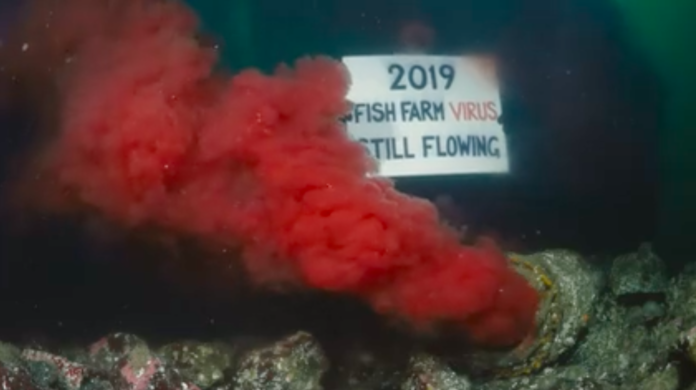A shocking video on Facebook by a local activist and nature photographer shows that fish farm blood infected with piscine orthoreovirus (PRV) is still flowing into Discovery Passage, two years after first being uncovered.
Tavish Campbell published a video on Tuesday, December 2nd, in which he dives underwater next to the infected blood, visibly spilling out into the ocean in the middle of Canada’s largest wild salmon migration route.
In the video, Campbell explains the blood flow was first discovered in 2017, but hasn’t stopped despite community pressure.
Infected Blood and Collapsing Sockeye
**2019: INFECTED BLOOD STILL FLOWING**Dec. 3, 2019Recent dives have shown that fish farm blood infected with piscine orthoreovirus (PRV) is still flowing into Discovery Passage, two years after first being uncovered. 2019 was the WORST Fraser River sockeye salmon return in Canadian history with 90% fewer fish returning to the river than forecast by DFO. These near extinct sockeye salmon swim through the effluent of both the processing plant and the infected fish farms twice on their migration to and from the Pacific Ocean.Genetic sequencing of this PRV reveals that it came from the Atlantic Ocean and was most likely imported via salmon eggs by the fish farm industry. Fisheries and Oceans Canada – DFO’s science reports this virus is harming Pacific salmon by rupturing their red blood cells, leading to jaundice yellowing and organ failure. With over 80% of the farmed salmon in B.C. infected with PRV, open net-pen fish farms and processing plants continue to release this virus into wild salmon habitat in blatant disregard for the precautionary principle. Under Section 56(b) of the Fisheries (General) Regulations, transferring farm salmon into the ocean from hatcheries infected with a disease agent is prohibited. DFO continues to approve this high-risk behavior by allowing infected farmed salmon to be grown in wild salmon migration routes on the B.C. coast. ‘Namgis First Nation of Alert Bay B.C. has recently filed a second lawsuit to review DFO’s policy decision to allow the stocking of open net-pen fish farms with PRV infected Atlantic salmon.This will be the fourth time DFO has been sued for disregarding the threat of PRV to wild salmon.Wild salmon are collapsing yet the blood keeps flowing.Tell @JustinPJTrudeau @BernadetteJordanNS to keep their election promise and transition fish farms onto land by 2025*Please Note: The collapse was not connected to the Big Bar landslide. Returning sockeye salmon are counted at the Mission hydroacoustic station near the mouth of the Fraser, far downstream from the slide. The collapse percentages shown are based on DFO's predicted run size versus actual run size.Huge thank-you to Farlyn Campbell and Jody Eriksson for logistics, banner painting, dive tending, filming, drone-catching, boat driving and general support!
Posted by Tavish Campbell Coastal Photography on Tuesday, December 3, 2019
“2019 and the blood is still flowing,” Campbell says in the video. “Unbelievable.”
The pipe from which the bloody waste pours out is connected to Brown’s Bay Packing, an Atlantic salmon processing company located in Campbell River.
See also: Hundreds of thousands of Atlantic Salmon escape from San Juan Islands fish farm
This year marked the lowest sockeye salmon return in history, with 90% fewer fish returning to the river than were forecast by Fisheries and Oceans Canada (DFO).
Campbell says the virus PRV is highly infectious and was most likely brought over via Atlantic Salmon eggs imported by the fish farm industry.
According to the official DFO website, all experimental exposures of the B.C. strain of PRV to Atlantic and Pacific salmon has failed to induce any disease. Activists, however, claim the virus ruptures the red blood cells of salmon and leads to jaundice and organ failure.
The DFO began testing for the disease at B.C. fish farms in June 2019, after a federal court judge ruled the department had to revise its no-test-required policy in February.
In September 2019, Prime Minister Justin Trudeau pledged to move all aquaculture in the province of British Columbia away from open fish farms and towards closed containment by 2025.



